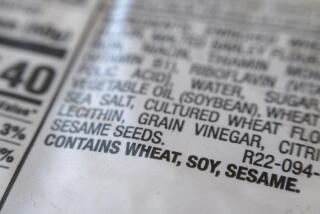FDA’s Food for Thought Upsets Procter & Gamble
- Share via
CINCINNATI — Either way you say it, it’s not too appetizing.
The government wants potato chips and other products containing Procter & Gamble’s new fat substitute to carry a label warning that olestra may cause “abdominal cramping and loose stools.”
No need to get so graphic, P&G; says. Less explicit words, like “intestinal discomfort and a laxative effect,” will suffice.
P&G; spokeswoman Sydney McHugh said Tuesday that the consumer products giant on April 1 asked the Food and Drug Administration to rewrite the label. The FDA will require it on all products containing the substitute, which will be test-marketed this summer under the brand name Olean in Pringles snack chips.
Company tests, McHugh said, showed that the FDA’s wording is unclear and will confuse people.
The company also asked the FDA to drop a requirement that the label be enclosed in a black box, saying P&G; consumer tests showed buyers perceived the product as unsafe.
The FDA on Jan. 24 approved olestra as an ingredient in salted snacks but required that such foods carry a warning saying: “This product contains olestra. Olestra may cause abdominal cramping and loose stools. Olestra inhibits the absorption of some vitamins and other nutrients. Vitamins A, D, E and K have been added.”
The Center for Science in the Public Interest--a Washington-based consumer watchdog group that opposes the FDA’s decision to allow olestra on the market--says neither label is sufficient. The center said the label should spell out the possibilities: diarrhea, nausea, gas and bloating.
“The word ‘diarrhea’ on a tube of Pringles might not be appetizing, but consumers have a right to know what olestra may do to them,” said Michael Jacobson, executive director of the center.
The FDA will decide on the wording sometime before olestra hits store shelves, spokesman Arthur Whitmore said.
This is more than a war of words, said marketing consultant Jack Trout.
“I think Procter is trying to essentially head off potentially big-time problems at the pass,” said Trout, president of Trout & Partners in Greenwich, Conn.
P&G; spent more than $200 million and 25 years researching and producing olestra. It says the synthetic chemical made from sugar and vegetable oil gives people the same gastronomic satisfaction as fat without the calories.
It looks like real fat, but its molecules are too large to digest, so it passes through the body unabsorbed.
Consumers are watching.
Some Carnegie-Mellon University graduate students have created a site on the Internet devoted to haiku about olestra.
“This tastes delicious,/but sorry, gotta run. O-/lestra is calling,” graduate student David Steere wrote.
Mark Thomas, a research engineer at the university, offered this string of verse: “Procter and Gamble/makes olestra and Pampers;/odd coincidence.”
More to Read
Inside the business of entertainment
The Wide Shot brings you news, analysis and insights on everything from streaming wars to production — and what it all means for the future.
You may occasionally receive promotional content from the Los Angeles Times.






